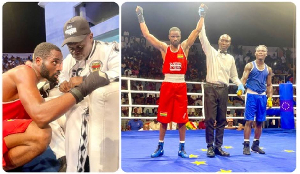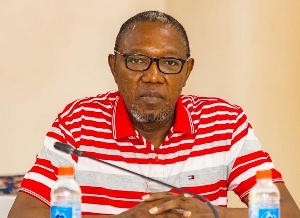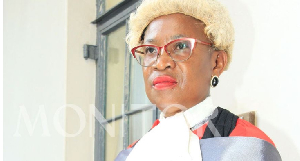Opinions of Friday, 16 July 2004
Columnist: Pukariga, Dasana
A Message from Dagbon
The tragedy that occurred in Yendi in March 2002 hit Ghanaians like a thunderbolt. The government was visibly shaken and the President swore to find the perpetrators of the ?heinous? crime. Now government is showing indifference and maintained a convenient silence as public interests in the details seem to have waned and there is even talk of fatigue in discussing the matter. However to the victim?s relatives, and democratic minded Ghanaians, the event is as fresh on their minds as on the day it occurred.
Three years on since the gruesome murders, why has government chosen to look away? Has the storm been weathered? Will time be a healer and the criminals get away unpunished? Has political expediency overtaken the revulsion for evil? What about the constitutional duty to do all manner of right to all persons?
The message from Dagbon is this: What occurred, on the ides of March of Yendi, was so brutal and outside the normal limits of cruelty; and no matter what and how long it takes, this criminal impunity must not be condoned.
What they did in Yendi, the three-day siege, shooting and killing of the King and his elders and the brutalization of his corpse was savage, primitive, and unacceptable. The terrible glee of the men dancing with body parts, and the sadism they demonstrated, reminds us of the culture of impunity that led to civil wars in neighbouring countries. There are even rumours of other horrifying things that happened, people posing with the severed head and other body parts of the king for pictures ? someone actually pointing a camera and taking shots of the evil doers.
And this perpetrated against a King who was not wicked; a king who rather went out of his way to extend friendship and hospitality to his foes, feeding and clothing many of them.
The people who were murdered along with the king were performing their customary roles as traditional guards to the king. They were protecting Dagbon and the King, the embodiment of the state, at the peril of their lives. Those who died at the palace were not the only ones. Others were ambushed and killed after they had escaped from the besieged palace. There are the well known cases of the killing of two young men: one who was killed and the corpse dumped into a latrine pit; and the other who was shot and hurriedly buried at a waste disposal site.
It is hard not to hate those who formed the dance party and marched with human body parts, or the fellow who dragged the corpse of the king and set it ablaze, and the other person who boldly admitted on national television that they did it because, in his words, they had not known peace under the King for twenty-eight years. All such people are human expressions of nihilism; they take pleasure in evil and are not shy to show it.
To this day there are those in Yendi who still are arrogant and think that the barbarity they committed is their right. They obstruct those trying to broker peace and taunt soldiers who have been sent there to keep peace. Yet these people are left unchecked, and their ways and attitudes, their assumptions and method of operating can only be encouraged by this indifferent attitude of government. They can even call into radio talk shows, from Yendi, and boast of responsibility for the crime yet there no action from government.
It is possible that the atrocity in Yendi was spontaneous or not fully thought through, but it doesn't look like it. It seems likely to a high degree that the assault on the palace was well planned, calculated and executed. The act seemed imitative of an incident, at the same Gbewaa Palace, where in 1969 a Ghana Army squad shot dead dozens of people. Dagbon was horrified but the incident has never been investigated. Everyone knows which government failed in this responsibility. It is not then a stretch to imagine that the murderers of Yendi had this on their minds: do it again, kill them and take the kingship by force, because government is on our side, no investigation will follow, just like in 1969. And so this why the response from government should have been the opposite and swift.
There are some things, one hopes, that everyone can agree on. A human being has to be depraved beyond believe to cut off the head and other parts of another human and blissfully pose for photos with the severed parts. Any group that engages is such conduct forfeits any claim to be humans or to being a friend of any political party. They are barbarians. Absolutely. Such barbarians should be rooted out of society.
Government should stop pretending that there is no evidence to find the butchers. There are enough leads to unravelling the crime: the evil-dancers, the evil-drummers, the cameraman, the admission on television, the evidence from the admission at the commission of inquiry, security reports, the BNI and CID in Yendi, and many more eyewitnesses. We know they massed and danced in that evil procession to a house to present body parts to someone. A vigorous investigation will solve this gigantic crime of murder in no time. It would be good not only for elemental justice but for Ghana and its future. A large operation should be carried out in Yendi to find the perpetrators, arrest them, and bring them to justice to show that, political allies or not, savagery is yesterday. It is not only the victims who are demanding this justice. It is important that all Ghanaians, CSOs, and international human rights organisations including the NEPAD Peer Review Mechanism - come forward to denounce the Kufour government?s apparent indifference to the carnage of Yendi in the most serious terms. If this is not done, the rule of law, good governance, and the whole Ghanaian democratic experiment will be at serious risk.
The terrible spectacle of the charred and decapitated body of the King cannot be erased from the minds of vast the majority Dagbamba and the traumatized women and shattered children who saw it happen. No one who has seen the remains of the King can forget. But the hurting may be soothed, in time, if those who were responsible are brought to justice; they must be paid the wages of their sin - or we all will someday. This is the message to the Kufour government and indeed to all Ghanaians.













